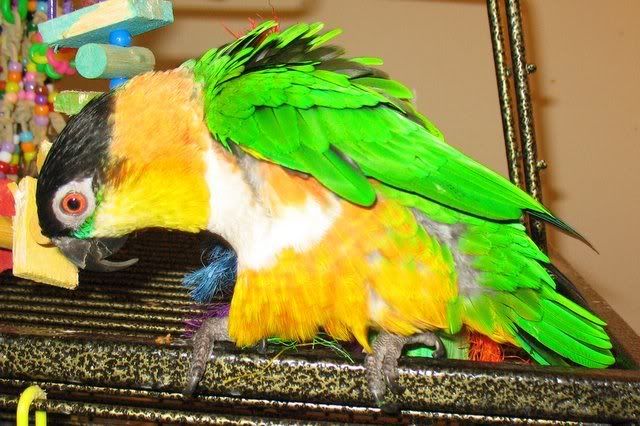Great pictures! I also have a Grey named Smokey. He is very loved and very spoiled. He has a large vocabulary and keeps us laughing all the time. It's nice to see other parrot people out there. I am considering getting another bird someday, but I don't know how Smokey would handle it. Any suggestions? ThanksThe article that helped me the most when introducing a new bird to our house was this one. But of course I just can't leave it at that!
I think the first thing to consider is that, with parrots, there are no guarantees. If you add another bird, they may get along wonderfully, to the exclusion of people. On the other end of the spectrum, there may be severe aggression (at the rescue where I volunteer I have seen several birds whose beaks have been bitten off by other parrots). Most likely, the relationship between the two birds will fall somewhere in the middle. For the most part, my parrots ignore each other physically, though they do often interact audibly (I'd say verbally, but a lot of the interaction is whistling and beeping).
The next consideration is what kind of bird to get. This can be a really hard decision! My feeling on this is to try to stick with similar-sized birds if at all possible, in order to lessen the chance that any serious damage would occur if an altercation happens. 5 of our 6 parrots are medium-sized birds; our budgie is significantly smaller. We are very protective of her to make sure nothing happens; however, this adds an extra layer of complexity to our house. As much as I love budgies, Thomas and I have agreed that once she's gone, we won't get another as we'll stick to medium-sized birds. At times this makes me sad, as I also absolutely love the large macaws and always expected we'd have one someday; I'll have to be content with the interaction I have with those at the rescue!
I am very much a grey person, so if I were single, I'd probably have a flock of greys. I love watching and listening to Stella and Max interact, and I think it would be even more fun with more greys. Thomas loves our greys but is not interested in adding any more to our house. He is very much a macaw person, so if he were single, he'd probably have a flock of mini macaws. In some ways, the caiques are almost a compromise that we fell into. However, we both adore them and would be very happy with a flock of caiques.
Based on my experiences, I think the best way to add a new bird to your house is to adopt an older bird that chooses you. You'll love any bird you bring into your house, but birds can be a bit pickier. If you start out with one that already likes you, you're miles ahead. And it's also less likely that the bird will bond strongly to the one you already have, cutting humans out of the equation. Baby birds love almost everyone and can change their minds when they hit maturity. I've mentioned her before, but a former friend of mine has 4 parrots -- 3 she bought as babies and one she got when the bird was either in her high teens or early 20s (I forget the details). The only bird she can handle is the older, rescue bird.
As outlined in the article, the theory behind our interactions with our parrots is "first among equals." Max, our timneh, was there first. She knew what it was like to have Thomas and me to herself. She always comes out of her cage first, get treats first, get acknowledged first, etc. Our bird sitter let Rocky out first over a year ago, and Max still hasn't forgiven her for this transgression.
When a new bird is introduced to our house, we are on high alert and supervise very carefully, for everyone's safety. Once stable behavior patterns have emerged over a period of months, we still supervise, but not as carefully. Our thought is that our parrots can fly away from any danger, and since they are similar size, it's unlikely any serious damage could occur before we'd break up the fight. However, if there had been any aggression shown, we'd continue to supervise carefully. Even though none of our parrots have ever shown any interest in Daphne, our budgie, we do not ever leave her unsupervised due to the size difference.
Though there are times when I think Max would prefer to be an only bird, I think, on balance, she does enjoy having the other parrots around. She plays whistling games with Calypso and Stella, she races Rocky up the stairs, she yells "Up!" a split second before it comes out of my mouth when I'm getting Stella off of the kitchen floor, etc.
So, Lori, I hope I answered your question! My biggest recommendation would be to adopt an older, similar-sized bird. In the wild, greys live in single-species flocks (i.e. exclusively greys) so you may have more success if the next parrot you decide to add is a grey. I'd also try to add the same gender parrot that Smokey is, hopefully reducing the incidents of aggressive hormonal behavior that an opposite-sex bird of the same species may encourage.
And then, reassure Smokey that you love him, keep special routines with him, let him bathe first, get treats first, etc. At least once a week I'll get Max up 30 minutes earlier than the rest of the parrots so she can have some alone time with us. She also goes to bed last every night.
Good luck!


No comments:
Post a Comment